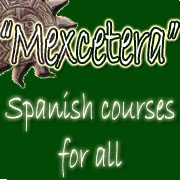Hello everyone,
Just a quick message to let you know that our next online Spanish courses for Post-beginners are starting very soon!
Take a look to the specific dates below;
[table “12” not found /]———————-
These lessons are NOT suitable for complete beginners. If you have already attended a Spanish course for beginners with us, the next Spanish course for you is post-beginners -1.
The post-beginners -2 is suitable for Spanish students who have already completed the post-beginner -1 course.
If you are unsure about your language level, complete a placement test online before you register on a course and we will get back to you with our suggestions.
Regular Spanish classes are delivered once a week for 8 weeks and semi-intensive Spanish classes are delivered twice a week for 4 weeks.
——————–
These Spanish courses will be delivered live online, what will you need?
- To have access to our virtual classroom you will need access to Internet, a headset (audio and microphone), a webcam (useful but not necessary), we will provide a link for you to join the lessons online.
———————-
The number of students in each class are limited. We still have places available. Book your place NOW!
For further information, contact us.
————————-
If you are interested in attending Spanish classes for beginners, intermediate or advanced. The information about the Spanish courses starting in May and the timetables is already available at our website HERE
If you would like to join a course, please register online HERE!

